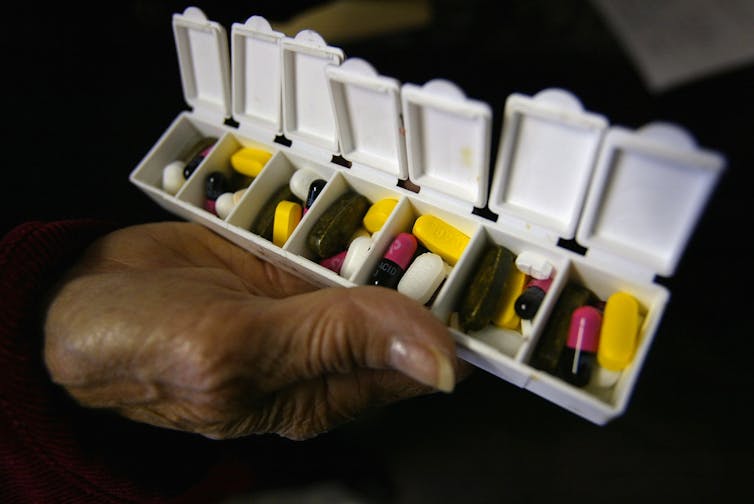A pandemic lesson: Older adults need to go back to their doctor and make preventive care a top priority
- Written by Laurie Archbald-Pannone, Associate Professor of Medicine, Geriatrics, University of Virginia
Older people have borne a higher burden of illness and death from COVID-19, with people 65 and older experiencing higher rates of hospitalization and death[1]. That’s only part of the sad story, however. In many instances, older people stopped seeing their doctors[2], and standard clinical care for their chronic medical conditions and preventive care was postponed.
When medical clinics reopened, after initial shutdowns in the spring of 2020, many patients didn’t return[3]. National surveys and the Centers for Disease Control and Prevention have shown that nearly a third, or about 32%, of U.S. adults reported delaying routine care[4] because of the pandemic from March to July 2020. In fact, a national survey from the Harvard School of Public Health, the Robert Wood Johnson Foundation and NPR found that one in five U.S. households[5] had trouble getting medical care when they needed it during the coronavirus outbreak. That was most often because of challenges getting an appointment, which resulted in poor health outcomes in more than half, or 57%, of the cases.
While care for medical emergencies is critical, preventive care is also important to optimize health, especially among older adults. As a geriatrician and professor of medicine[6], I think one of the best things the U.S. health care system could do is to make 2021 the Year of Preventive Care, particularly for older adults.
 Doctors will discuss how many medications seniors are taking during their wellness visits.
Spencer Platt/Getty Images[7]
Doctors will discuss how many medications seniors are taking during their wellness visits.
Spencer Platt/Getty Images[7]
Because of their vulnerability to COVID-19, older Americans were first in line for COVID-19 vaccines as they became available to the public. That aligned perfectly with public health prevention strategies. Vaccination for older adults, including those for influenza, shingles and pneumonia, is a key component of preventive care.
For older adults, though, there’s more to preventive care than vaccination. Preventive care is an important piece of health care, in keeping with the patient’s other medical conditions and goals of care.
Preventive screening in older adults should be based on a personalized prevention plan between the patient and their doctor. Preventive screenings ideally identify issues before problems occur – talking about living alone, change in memory, any falls and who is around to help out when needed.
For people over 65 years old who have Medicare Part B for 12 months, Medicare allows for an annual wellness visit[8] once every 12 months, often at no cost.
The Medicare annual wellness visit differs from a regular follow-up appointment for chronic medical conditions. This visit is fully focused on health risk and prevention. With the changes from the COVID-19 pandemic, your doctor or health care provider can even do it as a telemedicine video visit.
The focus of this visit is on preventive care [9] and health. It includes:
- A review of your medical and family history
- Development or updating of a list of current providers and prescriptions
- Height, weight, blood pressure and other routine measurements
- Detection of any cognitive impairment
- Personalized health advice
- Assessment of risk factors and treatment options
- Advance care planning
- A schedule or checklist for appropriate preventive services, such as screenings and vaccines
There’s no need to worry if you didn’t see your doctor in the past year. I’m sure they’d be happy to hear from you and work to keep you healthy. So, call your doctor or health care provider today to schedule an appointment, and ask whether you are eligible to schedule a Medicare annual wellness visit. As the nation begins to move past the highest case numbers and mortality of the COVID-19 era, the health care system and patients need to focus on optimizing health.
[You’re smart and curious about the world. So are The Conversation’s authors and editors. You can get our highlights each weekend[10].]
References
- ^ people 65 and older experiencing higher rates of hospitalization and death (dx.doi.org)
- ^ older people stopped seeing their doctors (doi.org)
- ^ many patients didn’t return (dx.doi.org)
- ^ reported delaying routine care (dx.doi.org)
- ^ one in five U.S. households (cdn1.sph.harvard.edu)
- ^ a geriatrician and professor of medicine (med.virginia.edu)
- ^ Spencer Platt/Getty Images (www.gettyimages.com)
- ^ Medicare allows for an annual wellness visit (www.medicare.gov)
- ^ preventive care (www.medicare.gov)
- ^ You can get our highlights each weekend (theconversation.com)
Authors: Laurie Archbald-Pannone, Associate Professor of Medicine, Geriatrics, University of Virginia

